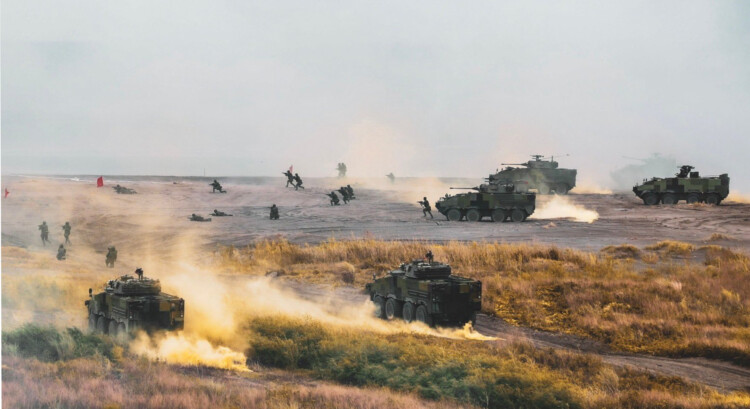Contentment with Subpar Responses
Another concerning aspect highlighted in the report is the complacency within Taiwan’s leadership and military in response to illegal Chinese incursions. Some may be content with the current military response to such intrusions, leading to a false sense of security. This attitude is risky, as it may erode Taiwan’s ability to fend off escalating Chinese aggression effectively.
The Urgent Need for Action
Taiwan must heed the warning provided by the RAND Corporation and take decisive action to strengthen its military capabilities. The following steps are essential for the island nation to prepare for any potential aggression:
Investment in Modern Defense Systems: Taiwan must prioritize modernizing its military equipment and technology to match China’s ever-evolving military capabilities. Upgrading outdated systems and investing in cutting-edge technologies will give the island nation a competitive edge.
Strengthening Alliances: Taiwan should continue fostering strong relationships with international partners, especially with the United States. Close cooperation with allies will not only deter potential aggressors but also provide access to advanced military resources and intelligence.
One year ago, our Congressional delegation’s arrival in Taiwan sent an unequivocal message: America stands with Taiwan as it defends itself and its freedom.
Solidarity with Taiwan is as important as ever, as our world faces a stark choice between democracy and autocracy. pic.twitter.com/MKK0FJr6jR— Nancy Pelosi (@SpeakerPelosi) August 2, 2023
Public Awareness and Support: Taiwan’s leaders must communicate the gravity of the situation to the public and garner support for bolstering defense capabilities. A united front is crucial in confronting any external threats.
Enhancing Military Training: Regular military exercises and training programs are necessary to ensure that Taiwan’s armed forces are well-prepared to respond promptly and effectively in the event of an invasion.
Strengthening Global Deterrence in an Evolving Landscape
The report not only focuses on Taiwan’s defense but also outlines critical gaps in U.S. and allied defense preparations. The evolving global security landscape demands reevaluating defense strategies to counter emerging threats.
The Changing Nature of Warfare
The analysis acknowledges that the nature of warfare has evolved significantly since the Cold War. The previous U.S. military superiority is no longer sufficient in the face of modern threats. China and Russia have made considerable advancements in military technology, eroding the once-unchallenged dominance of the U.S. and its allies.
Restoring Credible Postures of Deterrence
Despite the loss of absolute military superiority, the report suggests that credible deterrence is still achievable through collaboration among the U.S. and its allies. Joint efforts can restore effective deterrence postures without seeking dominance in every operational domain against China or Russia.
New #Chinese artificial island / military base in the works in the #SouthChinaSea, near #Vietnam
Reports of large Chinese land reclamation on Triton Island, in the Paracel Islands. #China took these islands from Vietnam in 1974.
Reports of a helicopter landing zone and maybe a… pic.twitter.com/0x1FOQCnYF
— Indo-Pacific News – Geo-Politics & Defense (@IndoPac_Info) August 3, 2023
Filling the Gaps: Recommendations for Allied Forces
To strengthen global deterrence, the report offers the following recommendations for the U.S. and its allies:
- Equip and Posture for Rapid Response: Maintain swift and decisive readiness to respond to emerging threats by optimizing military readiness and enhancing forward deployment.
- Build a Multidomain Sensing and Targeting Grid: Develop a comprehensive sensing and targeting network across all domains to gain a thorough understanding of potential adversaries’ actions and capabilities.
- Enhance Lethal Capabilities: Field advanced weapons and platforms capable of inflicting significant attrition on enemy forces during the initial stages of a conflict, deterring further aggression.
- Ensure Sufficient Munitions Inventory: Maintain adequate stocks of preferred munitions and consumables to sustain continued strikes against enemy forces.
- Prioritize Operational Challenges: Articulate a shortlist of priority operational challenges to effectively address aggression in highly contested environments.
- Encourage Innovation: Incentivize innovation within the defense industry to drive the development of cutting-edge technologies and capabilities.
- Collaborate with Congress: Engage Congress as a partner in defense policy to ensure budgetary and legislative support aligns with national security objectives.
- Define Future Operational Concepts: Collaborate with stakeholders to establish a shared understanding of joint and combined forces’ intended future combat strategies.
- Accelerate Force Adaptation: Promote rapid adaptation and modernization of military forces to address emerging threats effectively.
Addressing NATO’s Concerns, Assurances for Ukraine
The report also emphasizes the need for NATO allies to bolster their defense investment and posture to deter Russia’s aggressive actions. Collaborative efforts are essential in establishing a more resilient forward posture on NATO’s eastern flank.
35 years in 40 seconds : How Russia aggressively approached the borders of the NATO bloc pic.twitter.com/K71O8q68KZ
— S p r i n t e r F a c t o r y (@Sprinterfactory) August 3, 2023
Additionally, providing Ukraine with long-term Western security assistance, training, and a clear path to NATO membership is crucial in demonstrating unwavering support and solidarity amid Russia’s aggression.
~
In summary, the RAND Corporation’s report provides invaluable insights into the evolving global security landscape and the urgent need for Taiwan, the U.S., and its allies to adapt their defense strategies. By addressing the gaps in military preparedness and strengthening collaborative efforts, nations can restore credible deterrence against potential adversaries. Building a robust and agile defense posture demands sustained cooperation, innovation, and a shared commitment to ensure peace and stability in an ever-changing world. The time to act is now, and by heeding these recommendations, Taiwan and its allies can fortify their national security and uphold their commitments to freedom and democracy worldwide.










COMMENTS